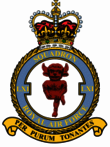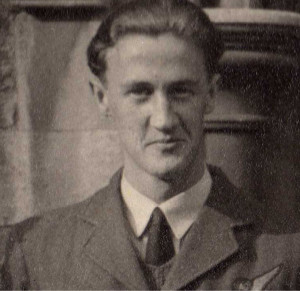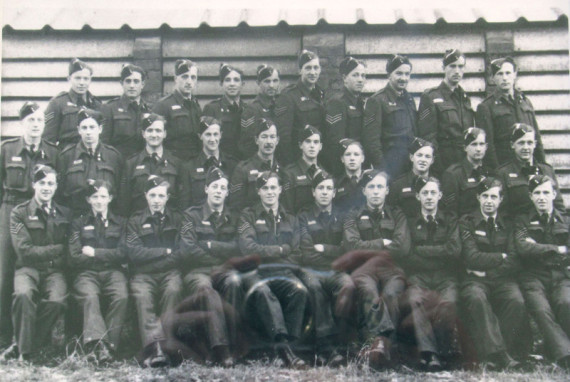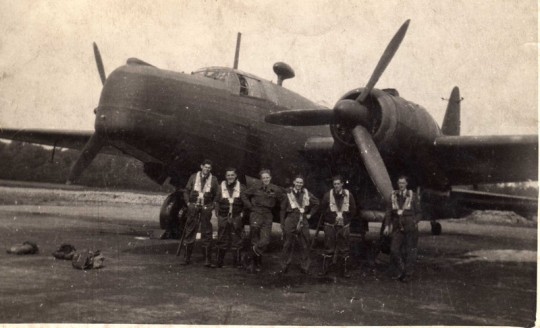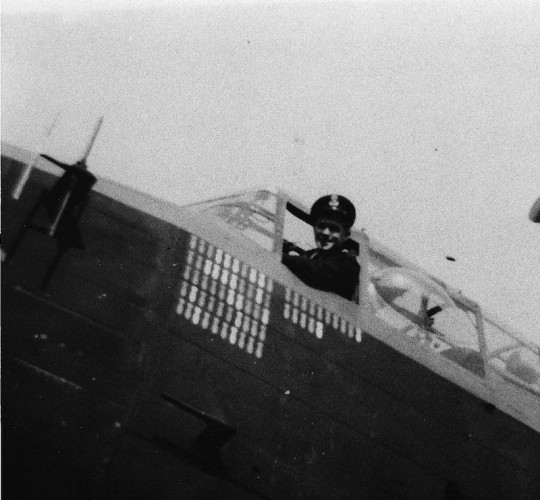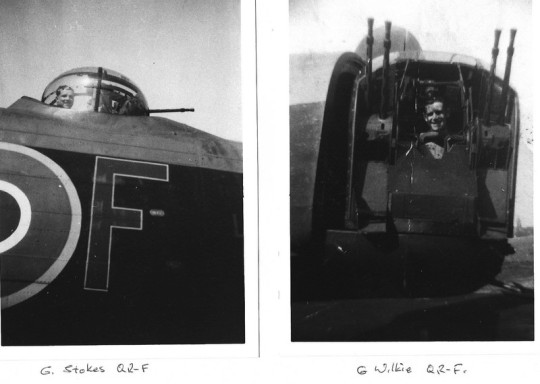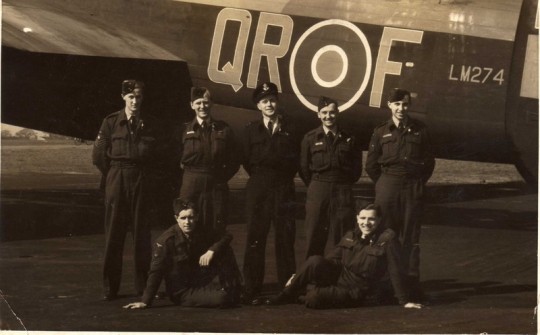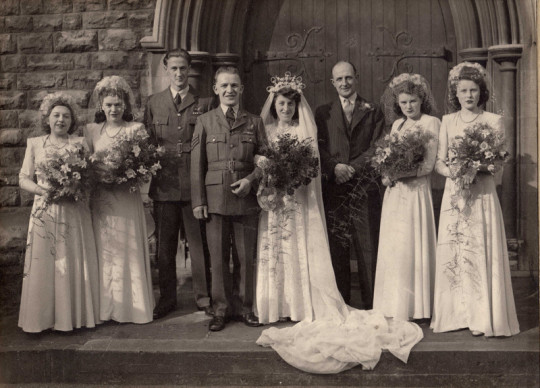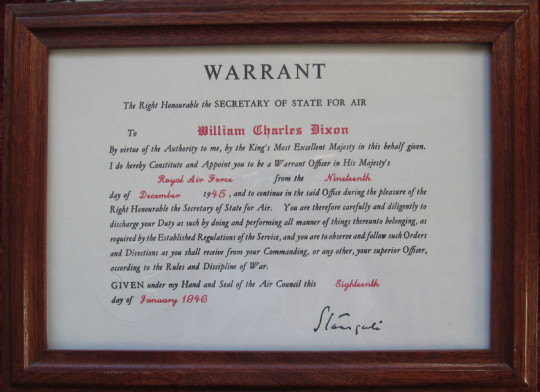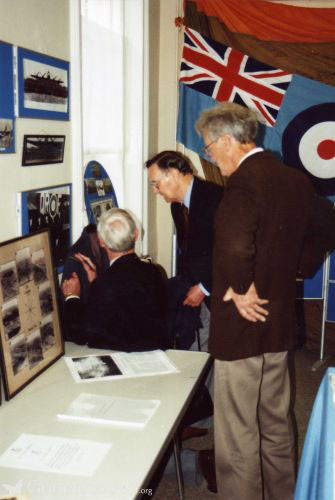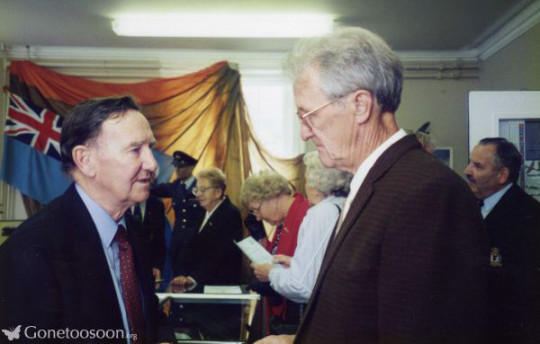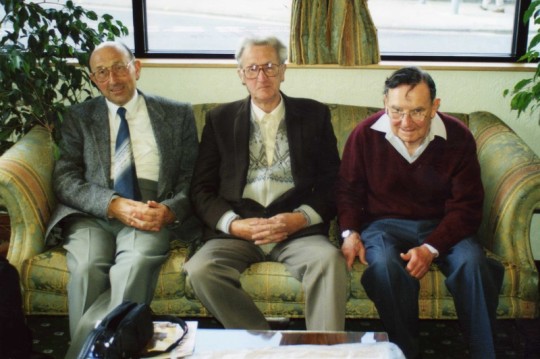Warrant Officer William Charles Dixon
I would like to thank Terry Dixon for supplying the information and wonderful photos about Warrant Officer William Charles Dixon and his WW11 crew.
........................................................................................
Warrant Officer William Charles Dixon.
Wireless Operator from 1943 to 1945.
Completed 32 operations in total and 18 in QR-F. Freddie, during his tour of operations with 61 squadron at RAF Skellingthorpe.
September 1943. No 2 Radio School, Yatesbury.
OTU, Silverstone. Relaxing after training flight.
His original crew being:
F/Lt Bill Burns pilot RAAF. of Broken Hill Australia.
F/O Tom Croally navigator. of Minster Kent,
Peter Hawkins bomb aimer, of London,
Len Hume Taylor flight engineer became a member of the crew when they joined 61 squadron at RAF Skellingthorpe.
W/O William Charles Dixon wireless operator, of Bolton upon Dearne , but born in South Shields
F/Sgt Graham Stokes mid upper gunner , from Coventry
F/Sgt George Wilkie rear gunner, Sunderland.
January 1944. 8 Air Gunnery School (AGS) Evanton.
April 1944. 17 Operational Training Unit (OTU) Silverstone.
September 1943. His training commenced at No.2 Radio School at RAF Yatesbury. Completeing 25.40 Min on Dominie and Proctor aircraft.
January 1944. No.8 Air Gunnery School, Evanton. Completing 20.05 Hrs on Avro Anson.
April 1944. No.7 (O) AFU Bishopscourt. 16.45 flying time.
May 1944. No.17 OTU Silverston (Turweston). Completed 43 hrs day and 32.45 Hrs night flying on Wellington aircraft.
August 1944. 1654 Heavy Conversion Unit (HCU) Wigsley. completing 18.05 Hrs day and 19.40 Hrs night flying.
September 1944. No. 5 Lancaster Finishing School (LFS) Syerston. 7.30 hrs day and 6.05 hrs night flying on Lancasters.
29 September 1944. Active service with 61 Squadron. RAF Skellingthorpe
F/L Bill Burns RAAF pilot.
6 October. Bremen. QR-C. Dixon blacked out through lack of oxygen. Made 2 runs over target. Aircraft damaged by flak.
7 October. Flushing-Walcheren. QR-V. Note; This and the following raid on the Flushing area of Walcheren was to breach the dykes in support of the advancing land forces.
11 October. Flushing-Walcheren. QR-A
14 October. Brunswick. QR-A. Bill describes this in his log book as a "wizard prang"
19 October. Nuremberg. QR-A. Another "wizard prang"
2 November. Dusseldorf. QR-F. Caught in searchlights over target then suffered heavy flak.
4 November. Ladbegen. QR-F. Drained canal.
6 November. Gravenhorst. QR-F. Drained canal.
21 November. Ladbergen. QR-F. Wizard prang
22 November. Trondheim. QR-F Having lost height approaching the target they spent time going round and round a valley to gain height. On arrival they were recalled without dropping their bombs. The cookie was dropped in the north sea, the rest of the bomb load was then brought back to base. Apparently Bill Burns was a ladies man and he wanted to get back to Skellingthorpe so the F/E had to lean out the fuel. As they touched down at Skellingthorpe air field their fuel ran out and all 4 engines cut out on the runway. NO FUEL. PHEW close call that !!!.
17 December. Munich. QR-F. Made two runs over target during which lost an engine.
18 December. Gdynia. QR-F. Made 2 runs over target.
27 December. Rheydt. QR-F. Daylight raid, diverted to Middleton St George on return.
31 December. Houffalize. QR-F. Rundsted Salient.
1945.
1 January. Gravenhorst. QR-G. Just like H.L.B.
7 January. Munich. QR-D. Couldn't climb over alps, opened bomb bay doors and tobogganed over. 2 runs over target, with cookie.
13 January. Politz. QR-Y. Flak moderate.
14 January. Merseburg. QR-F. Mid upper turret u/s. Flak moderate.
1 February. Siegen. QR-F. 3 runs over target.
7 February. Ladbergen. QR-H. 2 runs over target.
8 February. Politz. QR-F. Attacked by 5 JU 88s. Gunners shooting down 2.
13 February. Dresden. QR-F. Flak moderate, wizard prang.
14 February. Rositz. QR-F. Flak moderate, 2 runs over target.
19 February. Bohlen. QR-F. Heavy flak.
21 February. Gravenhorst. QR-F. heavy flak, saw 13 shot down.
6 March. Bohlem. QR-U. Attacked by 2 JU 88s.
12 March. Dortmund. QR-G. Daylight raid. Exit Dortmund?
14 March. Lutzkendorf. QR-A. Heavy flak.
16 March. Wurzburg. QR-Y. Moderate flak
4 April. Nordhausen. QR-F. H.L.B Exercise.
7 April. Molbis. QR-F. Made 2 runs over target, aircraft damaged by flak. This was his final operation.
On one occasion apparently Tom, the navigator phoned the station commander up and gave him a few words of advice, about things that were upsetting him, after which the station commander said , "do you know who you are talking to", Tom said "yes, do you", the station commander said , "no",Tom then said "good" and put the phone down !!!
QR-F Freddie, Serial No.: LM274. Total Op's: 69
Fate: Survived the war Scrapped 16 April 1946. At Ex RAF LindHolm Doncaster.
F/Lt Bill Burns leaning out of 65 op. QR-F.
Pilot and Flight Engineer in position.
F/O Tom Croally Navigator.
L to R. Standing; F/Sgt William C. Dixon. Bob Wake. F/Lt Bill Burns. F/O Tom Croally. and F/Sgt Len Taylor. Sitting. F/Sgt George Wilkie and F/Sgt Graham Stokes.
1944. Newly weds Mr and Mrs Graham Stokes. William best man.
2010. Above and below: Mr Davidson with Tom and William at 'The Lawns', Lincoln.
Relaxing at the Grand Hotel, Lincoln.
L to R: Len Taylor. William Dixon and Tom Croally.
Message from his son,Terry Dixon.
Dad started life as an apprentice plumber but the second war interrupted that he then went to Skellingthorpe in Lincolnshire he joined 61 squadron in 5 group bomber
command as a wireless op/ag air gunner from 1943 to 1945 some missions were in QRF LM274 Lancaster dads crew called him tiny as a nick name but dad was 6ft tall when dad left Skellingthorpe he was
posted out to India for a time my dad would never say any thing about the war but he did tell me the funny things they did as a crew, on leaving the RAF Dad was given a form to apply for his medals
my dad said if i have to fill in a form after what we have just gone through you can keep them he never sent for them and also he allowed me to ask for his warrant but he said never send for my
medals and i his son said ,ok never, and i never will, he then went back to wade and sons of Wath to finish his apprenticeship
My dad then went on to be a pipe fitter welder, charge hand, forman , on the big petroleum plants like Flixborough dad was known as, Charlie pipe, another nick name they had for him he also
worked for a company called head Wright son and also the green roof engineering company on York Doncaster he worked at many pits through out the country fitting coal washing plants but he never
worked for the NCB he worked on the manvers cokeing plant ovens, some times he stayed in the Butlins camps around the country and went to work from there each day so he had some night life after work
and so his wife my mom and my self his son could be with him and have a holiday too he was also a very good joiner he loved wood work also he loved his garden he had 3 green houses he would grow his
own food everything from tomatoes to beans carrots parsnips peppers potatoes the hole range he loved roses too but the sad part is his job caused his death fibrosis asbestos dust filled his lungs no
cure for that yet.
...........................................................................................
Editors comments.
As a person with operational experience I know that W/O Dixon's simplistic log book reports conceal a tour full of danger, excitement, tension and luck.
It beggars belief how they avoided being shot down by 7 JU88s when the pilots of these enemy fighters claimed, or should I say, boasted, that no bomber ever survived after they made contact.
Then there were the times when their aircraft suffered damage and engine failure, and the time when all four engines cut out just as they touched down. Luck once again on there side, because, if this had happened seconds earlier they would have been goners.
Coupled with all of these things is the number of times when they deliberately made 2nd bombings runs so as to press home their attacks.
Heroic is what I would call it.
How sad it is that these brave men chose not to tell their stories so that future generations could appreciate their bravery and dedication.
H.James Flowers


